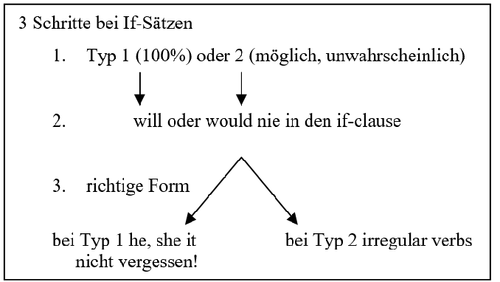If-sentences/Kontrastierung
Die If-Sätze Typ I und Typ II lassen sich nicht eindeutig unterscheiden, da man einerseits fest mit einem (doch eher unwahrscheinlichen) Lottogewinn rechnet, andererseits z.B. Regen und schlechtes Wetter nicht 100% voraus berechnen kann.
Beispiele:
If it rains, I will stay at home.
If I were you, I wouldn't go out today.
Nachdem Du dich auf einen Typ festgelegt hast, muss das Schema konsequent durchgehalten werden.
| if-clause | main-clause | |
|---|---|---|
| Typ I | simple present | will +inf |
| Typ II | simple past | would + inf |
Interactive Exercises
Without you
Analyze which types these if-sentences are. Then move the words into the gaps.
If you don't work in the afternoon, I will take you into town then.
If I didn't have you, I wouldn't know what to do.
If it rains, we will ride the bus.
If I had money, I would buy a new sweatshirt.
If I were you, I would wait for a special sale.
School
Analyze which types these if-sentences are. Then put the words in brackets () in the right form:
Dad: Do you like it at school, Tom?
Tom: If we didn't have to (not, must) do so many stupid conditional sentences, I’d enjoy it more.
I would do(do) sports more often.
If I had (have) my own horse, I would go (go) riding every day.
Dad: If I were (be) you, I wouldn't complain (not, complain) so much!
If you don't learn, you won't pass (not pass) the exam.
complain = sich beschweren
Dad: Do you like it at school, Tom?
Tom: If we didn't have to do so many stupid conditional sentences. I’d enjoy it more.
I would do sports more often.
If I had my own horse, I would go riding every day.
Dad: If I were you, I wouldn't complain so much!
If you don't learn, you won't pass the exam.
mixed types
Analyze which types these if-sentences are. Then put the words in brackets () in the right form:
If you crossed (cross) the road, you would always look (always,look) left, wouldn't you?
If you saved (save) an old lady's dog at a zebra crossing, you would probably get (probably, get) a reward.
Sorry, if your boy-friend is(be) under eighteen, he won't be able (not, be able) to get a drink in a pub.
If you eat (eat) an English breakfast, you won't need (need) any lunch.
Stupid you! If you were (be) sensible, you would never go (never, go) out without a raincoat or an umbrella.
If the teacher told (tell) you that English weather was worse than German weather he would be (be) talking nonsense.
If you drove (drive) in the highlands, there could sometimes be fog. Be careful!
But if you stay (stay) in London, you won't see (not, see) fog or smog.
If you walked across the grass in English parks, no one would stop (stop) you.
If you crossed (cross) the road, you would always look (always,look) left, wouldn't you?
If you saved (save) an old lady's dog at a zebra crossing, you would probably get (probably, get) a reward.
Sorry, if your boy-friend is(be) under eighteen, he won't be able (not, be able) to get a drink in a pub.
If you eat (eat) an English breakfast, you won't need (need) any lunch.
Stupid you! If you were (be) sensible, you would never go (never, go) out without a raincoat or an umbrella.
If the teacher told (tell) you that English weather was worse than German weather he would be (be) talking nonsense.
If you drove (drive) in the highlands, there could sometimes be fog. Be careful!
But if you stay (stay) in London, you won't see (not, see) fog or smog.
If you walked across the grass in English parks, no one would stop (stop) you.





